INTERVIEW BY VAZHA TAVBERIDZE FOR RFE/RL
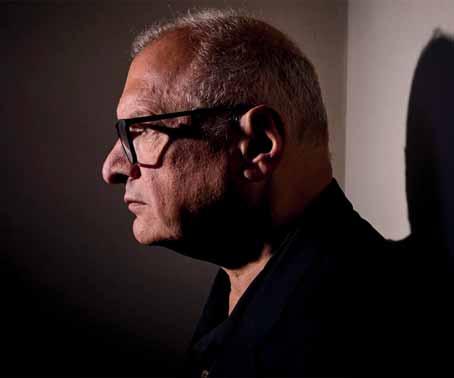
Yuri Felshtinsky is a historian and journalist specializing in Russia and the former Soviet Union. He has authored such volumes as ‘Blowing Up Ukraine: The Return of Russian Terror’ and ‘The Threat of World War III,’ published in 2015. He also co-authored ‘Blowing Up Russia’ jointly with Alexander Litvinenko, the former lieutenant-colonel working for the Russian intelligence service who was poisoned with radioactive Polonium-210 in London in 2006. Radio Free Europe’s Georgian Service sat down with Felshtinsky to get his take on Putin’s mindset and what to expect next.
“Russia, Putin, already committed suicide [with this war], they just don’t know it. Just like Hitler started out on his road to suicide on 1st of September in ’39,” Felshtinsky tells us. “When Hitler attacked Poland, he had Italy and Japan supporting him, Hungary too, and the Soviet Union until June 1941. No-one was able to help Poland because the joint attack happened too quickly. And France and Britain simply were not ready to attack Germany. This is not what's happening now. Russia is basically alone, it has Belarus, of course, which was occupied by Russia in 2021. It has Iran, and it has North Korea.
FOCUS ON GUDAURI
Tensions between local "mafia" and foreign ski workers create growing problems for Georgia's top
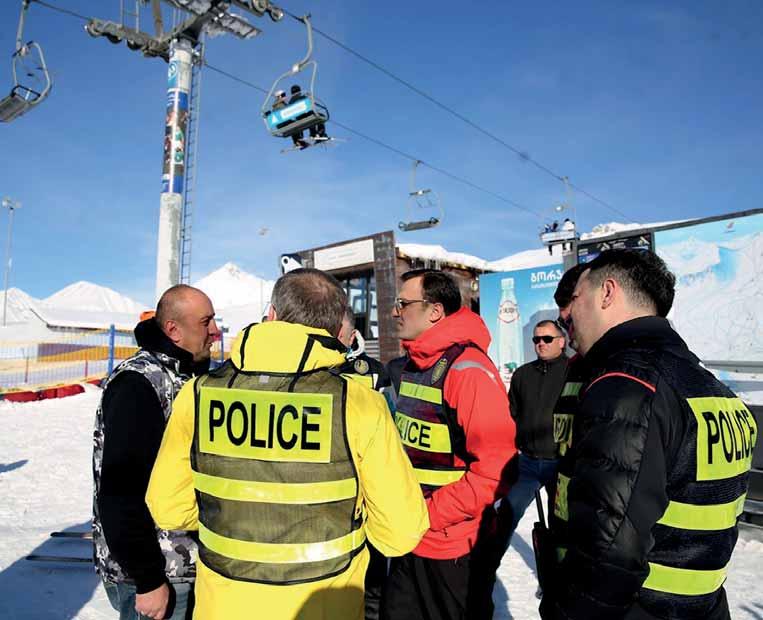
In this week’s issue...
Ukraine’s Chargé d’Affaires Suggests Ukrainians be Evacuated from Georgia
NEWS PAGE 2
With or Without the UNM
POLITICS PAGE 4
Challenges to the Liberal Order. Part 3
POLITICS PAGE 4
Hidden Treasure: XVII Century Wine Bar-Restaurant Archive in Old Tbilisi

BUSINESS PAGE 7
Trends among Int’l Visitors to Georgia in the Third Quarter of 2022
ISET PAGE 8
BIM Solutions Georgia - International Standard of Construction Project Management in Georgia

BUSINESS PAGE 9
Ketevan Tukhareli’s Translation of Makvala Mrevlishvili’s Poem
CULTURE PAGE 11
PreparedforGeorgiaTodayBusinessby
Issue no: 1383 • • JANUARY 27 - FEBRUARY 2, 2023 • • PUBLISHED WEEKLY
PRICE: GEL 2.50
Continued on page 6 Markets of BONDSPricew/wm/mSTOCKSPricew/wm/m GRAIL 07/2888.46 (YTM 6.58%) +0,3%+0,3% Bank of Georgia (BGEO LN)GBP 26.05 +1,6% GEBGG 07/23100.53 (YTM 4.92%) 0,1% +0,4% Georgia Capital (CGEO LN)GBP 7.48 +0,8% 0,3% GEOCAP 03/2496.48 (YTM 9.49%) +1,0%+1,5% TBC Bank Group (TBCG LN)GBP 22.35 +1,4%+1,6% SILNET 01/2798.26 (YTM 8.90%) +1,1%+3,8% TBC 06/2498.35 (YTM 7.00%) 0,0% 0,0% CURRENCIESPricew/wm/m GEL / USD2,6454 0,9% 1,7% GEL / EUR2,8761 0,4% +0,6% COMMODITIESPricew/wm/m GEL / GBP3,2737 +0,6%+1,0% Crude Oil, Brent (US$/bbl)88,19 +4,4%+5,1% GEL / CHF2,8670 0,5% 0,7% Gold Spot (US$/OZ)1 931,04 +0,8%+7,4% GEL / RUB0,0384 1,3% 1,5% GEL / TRY0,1407 1,0% 2,4% INDICESPricew/wm/m GEL / AZN1,5587 1,1% 1,7% FTSE 1007 784,67 1,0% +4,2% GEL / AMD0,0067 1,0% 2,2% FTSE 25019 801,69 1,4% +5,2% GEL / UAH0,0717 0,8% 1,6% DAX15 102,95 0,2% +8,3% EUR / USD0,9198 0,5% 2,3% DOW JONES33 629,56 2,0% +1,3% GBP / USD0,8079 1,5% 2,7% NASDAQ11 364,41 +2,6%+8,3% CHF USD0,9218 0,5% 1,2% MSCI EM EE34,43 +0,2%+9,2% RUB / USD68,9184 +0,2% 0,3% MSCI EM1 038,68 +0,8%+8,8% TRY / USD18,8106 +0,1%+0,8% SP 5004 019,81 +0,5%+4,6% AZN / USD1,6966 0,0% 0,0% MSCI FM2 243,80 +0,5%+6,4% AMD USD395,5000 0,2% +0,5%
Police in Gudauri near the popular ski lifts. Photo from the Ministry of Internal Affairs
winter resort
9
PAGE
Felshtinsky: “The West needs to understand the only way to end this war is to win it”
Yuri Felshtinsky. By Alberto R. Roldán for larazon
Ukraine’s Chargé d’Affaires Suggests Ukrainians be Evacuated from Georgia
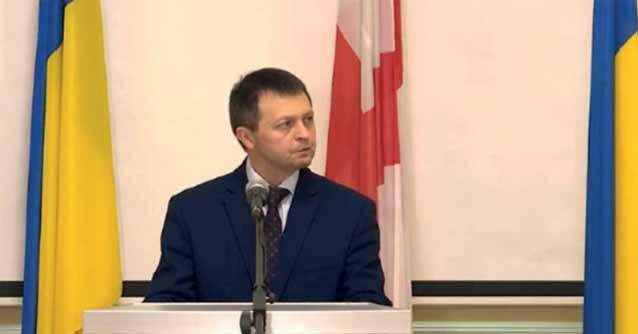
Maritime Transport Agency Rejects Sochi Port Administration’s Statement on Starting Sea Transport Negotiations
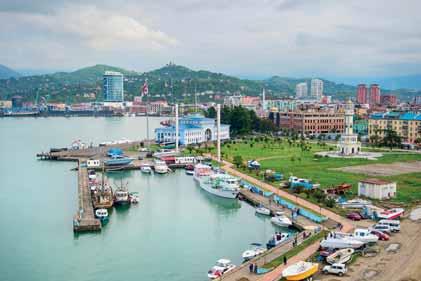 BY SOPHIE HODLER
BY SOPHIE HODLER
The Maritime Transport Agency of Georgia rejected claims made by the Sochi Port Administration about the start of maritime transportation between Georgia and Russia.
“Georgia does not have sea travel access to Russian ports,” stated the Maritime
Transport Agency.
The Agency underlined that not only does Georgia not have sea travel access to Russian ports, but also that the Russian side has not requested to begin sea transportation negotiations.
The Maritime Transport Agency rejected claims made by Yury Vladimirov, General Director of Sochi Port JSC, about discussing the formation of maritime transportation in the Black Sea between Georgia and Russia.
Adam Kinzinger: Georgian Dream Is Not Even Hiding Their Love for Russia Anymore
The Georgian government claims to be eager to join the European Union and NATO, but it is actually moving in the other direction, Andrii Kasyanov, Ukraine’s Chargé d’Affaires in Georgia, said in an interview with European Pravda.
According to Kasyanov, Georgia formally applied for EU candidate status following the wish of the majority of the population; the country’s western perspective is enshrined in the Georgian
Constitution.
“But what do we actually have? Based on the comments of its politicians, the country that has consistently moved towards the EU and NATO has now begun to move in the other direction. This is a blatant disregard for the basic principles of a common foreign and security policy. This is an evident fact to us, and it is a violation of the European Union’s third package of sanctions,” he stated.
According to the Ukrainian diplomat,
the Georgian government’s desire to resume direct flights with Russia runs counter to the EU’s policy of banning flights following Russia’s invasion of Ukraine.
Andrii Kasyanov further stated that the Ukrainian Embassy in Georgia has not ruled out the possibility of evacuating Ukrainian citizens if there is a risk and the massive influx of Russians into the country following the restoration of direct flights between Georgia and Russia.
EU, Georgia Hold 5th Strategic Security Dialogue
BY SOPHIE HODLER
Congressman Adam Kinzinger has highlighted the Georgian authorities’ proKremlin leaning, and responded to Georgian Dream Chairman Irakle Kobakhidze’s anti-Western sentiment.
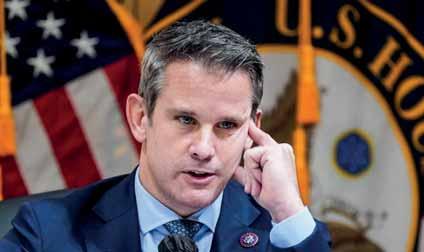
In a recent CNN interview with Ursula von der Layen, Christiane Amanpour cited Georgia as an example of Russia’s sanctions avoidance. In response to the CNN interview, Kobakhidze stated that CNN was engaging in “large-scale coordination directed against Georgian interests” that necessitated “immediate reaction.”
“Georgian Dream is not even hiding anymore their love for Russia. Very sad,” Kinzinger said in a tweet.
French Company Acquires Shares and Becomes Owner of TAV Airports
Irakli Garibashvili, Prime Minister of Georgia, met Edward Arkwright, Deputy Chief Executive Officer (CEO) of Groupe ADP (Aéroports de Paris.) The French company has acquired shares and is now the owner of TAV Airports.
The dignitaries reviewed the cooperation prospects and development strategy for the future of the airports. The PM noted the swift economic advancement of the country, coupled with a growing inflow of tourists, creates grounds for setting ambitious plans in Georgia. Focus was put on further advancement of services at the international airports of Tbilisi and Batumi.
Officials also spoke about the long-term development plan for the Tbilisi International Airport, which is being completed. The PM shared his own ideas with the visiting delegation, noting that the Government of Georgia stands ready
to actively cooperate in future inter alia towards promoting the entry of new air carriers and route destinations.
Work will be completed on the development of the plan for the Batumi International Airport in February.
Groupe ADP (Aéroports de Paris) manages and operates over 20 airports on various continents of the planet. Its facilities are widely known for the most qualified services and sustainable development. Groupe ADP (Aéroports de Paris) was incorporated in 1945. It aims to deliver to passengers high quality hospitality standards and superior quality travel experiences.
Along with its partners, Groupe ADP is building the airports of the future based on innovations, sustainable development, multi-functional and sophisticated services.
Groupe ADP manages Charles de Gaulle (CDG) and Orly Airports (ORY) in Paris.
The fifth high-level EU–Georgia Strategic Security Dialogue took place. It reflected the strong level of commitment by both parties to take the cooperation forward, including on foreign and security policy, in line with the EU-Georgia Association Agreement.
The parties highlighted the historic importance of the decision of the European Council of 23 June 2022 to recognzse Georgia’s European perspective.
The participants discussed the consequences of the conflict between Russia and Georgia in August 2008, including the conflict dynamics in the Georgian regions of Abkhazia and Tskhinvali region/South Ossetia. They called upon the Russian Federation to fully implement the EU mediated 12 August 2008 ceasefire Agreement. Both sides stressed the importance of the Geneva International Discussions. They once again highlighted the important role of the EU Monitoring Mission for peace and security in Georgia, and underlined the necessity of ensuring the full implementation of its mandate.
The European Union reaffirmed its unwavering support for Georgia’s sovereignty and territorial integrity within its internationally recognized borders.
The EU and Georgia also exchanged on topical foreign policy issues, security challenges in the South Caucasus and the wider region, including Russia’s military aggression against Ukraine. The sides highlighted the critical importance of increasing connectivity, including in the Black Sea as a mutual priority.
The European Union commended Georgia’s role as an important partner in EU CSDP missions. The sides expressed readiness to continue deepening security cooperation in line with the priorities set out in the EU Strategic Compass as
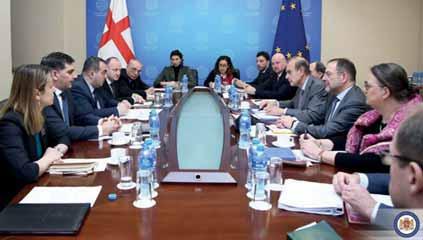
well as addressing the hybrid threats and increasing Georgia’s capacities and resilience, among others through the European Peace Facility.
The dialogue was co-chaired by First Deputy Foreign Minister of Georgia Lasha Darsalia and Deputy SecretaryGeneral for Political Affairs / Political Director of the European External Action Service Enrique Mora. First Deputy Defense Minister of Georgia Lela Chikovani also took part in the meeting.
“The meeting is taking place at a very challenging period in Europe as Russia’s military aggression in Ukraine has significantly changed its security environment, especially in the Black Sea region,” noted First Deputy Foreign Minister Darsalia. “We shared with the EU side the challenges and risks that arise from Russia’s continued occupation of Georgia’s regions. We also had a useful exchange on ways to promote peace and security in the South Caucasus, while at the same time seek possibilities for cooperation in areas of mutual interest and that is enhanced connectivity in the Black Sea. The meeting also served as an
important platform to identify next steps towards enhancing our cooperation in the CSDP in line with priorities outlined in the Strategic Compass.”
“Our meeting reconfirmed the shared commitment of the EU and Georgia to the core principles on which European security is built, and our common vision of a peaceful and prosperous South Caucasus region,” said Deputy SecretaryGeneral Enrique Mora, noting that “Georgia remains one of the closest and most important partners of the EU in the region. In current times, where the security context has radically changed because of Russia’s war of aggression against Ukraine, the EU reiterates its firm commitment to support Georgia to achieve peaceful conflict resolution, as well as to contribute to the stabilization of the whole region. To this end, the EU has continued to step up its support in strengthening Georgia’s resilience.”
The meetings of the high-level EU–Georgia Strategic Security Dialogue are held once a year and cover issues of common interest in the field of foreign and security policy.
GEORGIA TODAY JANUARY 27 - FEBRUARY 2, 2023 2 NEWS
Ukraine Latest: US and Germany to Send Tanks to Ukraine
BY ANA DUMBADZE
The US and Germany both said Wednesday they would send dozens of tanks to Ukraine.
Berlin officials said they would send 14 of their own tanks, and will allow others to send their own German-made tanks, in an about-face from its previous position. US President Joe Biden followed suit shortly thereafter, announcing plans to send 31 Abrams tanks to Ukraine.
Ukraine has requested modern tanks from its allies for months, but only the UK had so far responded, pledging to send 14 of its Challenger 2 tanks.
Kyiv has said a number of times that it needs hundreds of tanks to fight Russia, particularly ahead of expected spring offensives.
Zelensky said Tuesday that a decision on tanks is needed, as Russia is preparing “for a new wave of aggression with the forces it can mobilize.”
Zelensky thanked US President Joe Biden for his decision to provide Kyiv with 31 Abrams tanks as well as training and maintenance support.
He said the transfer of M1A1 Abrams tanks is, “an important step on the path to victory.”
“Today the free world is united as never before for a common goal – liberation of Ukraine,” he added.
The Biden administration approved a $400 million in fresh military aid for Ukraine that will include the 31 US-made M1A1 Abrams tanks.
Russia has expressed mounting fury at
the prospect of modern Western tanks being sent to Ukraine, calling it “extremely dangerous” and saying previous “red lines” were now a thing of the past.
The Russian Embassy in Berlin called the German government’s decision “extremely dangerous” and said it “takes the conflict to a new level of confrontation” while the foreign ministry warned that “red lines” were a “thing of the past” as it slammed what is saw as the West waging a “hybrid war” against Russia.
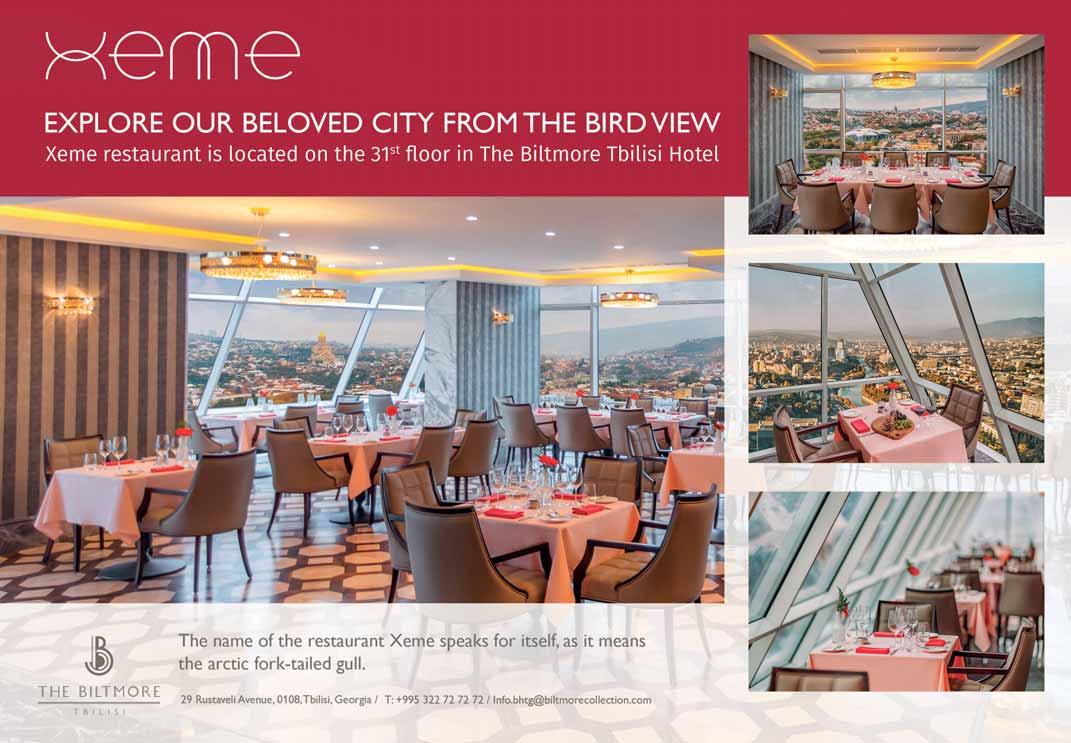
The use of modern Western tanks by Ukraine is likely to add momentum to its efforts to push Russian forces out of occupied areas of the country, particularly the eastern Donbas region, but Russia sees the gift of tanks as further evidence that the West is fighting what it sees as a proxy war against it in Ukraine.
TRAINING FOR ABRAMS TANKS WILL TAKE PLACE OUTSIDE OF UKRAINE, WHITE HOUSE SAYS
National Security Council spokesman John Kirby said the Pentagon’s upcoming training for Ukrainians using the M1A1 Abrams tanks will take place outside of Ukraine.
Kirby said the US has not yet decided on a specific location or timing for the training.
He also said that the Pentagon does not have extra tanks to pull from its current arsenal to provide for Ukraine.
“We just don’t have them,” Kirby said, adding that “even if there were excess tanks it would still take many months anyway.” He also declined to provide a timeline of when the M1A1 Abrams tanks would be ready for Ukrainian forces.
GERMANY TO SEND STARLINK INTERNET TERMINALS TO UKRAINE
Ukraine’s Deputy Prime Minister for Digital Transformation Mykhailo Fedorov said on Telegram that Germany plans to
transfer a batch of Starlink terminals to Kyiv.
Starlink, the satellite internet arm of Elon Musk’s SpaceX, has been crucial in keeping Ukraine’s military online during the war against Russia, even as communication infrastructure gets destroyed.
Last year, Musk reversed his previous decision to cut off funding for Starlink in Ukraine.
“The hell with it,” the billionaire later tweeted, “even though Starlink is still losing money & other companies are getting billions of taxpayer $, we’ll just keep funding the Ukraine govt for free.”
STATE DEPARTMENT DENIES
REPORTS OUTLINING RIFF BETWEEN WASHINGTON AND BERLIN OVER TANKS FOR UKRAINE
The State Department downplayed reports that Germany and the US were at odds over whether to provide Ukraine with Leopard 2 and M1A1 Abrams tanks.
“Time and again, Germany has proven itself as a stalwart ally of the United States,” Price said, adding that Berlin and Washington have only had constructive discussions in the weeks leading up to the separate security assistance announcements.
Earlier on Wednesday, German Chancellor Olaf Scholz announced that Berlin would provide Ukraine with Leopard 2 tanks.

Germany said its goal was to “quickly assemble two tank battalions with Leopard 2 tanks for Ukraine.” The country will supply 14 Leopard 2 A6 tanks in what it called a “first step.”
UKRAINE FORCES PULL BACK
FROM DONBAS TOWN AFTER ONSLAUGHT
Ukrainian forces have conducted an organized retreat from a town in the eastern region of the Donbas, an official said, in what amounted to a rare but modest battlefield triumph for Russia after a series of setbacks in its invasion that began almost 11 months ago.
The Ukrainian army retreated from the salt mining town of Soledar to “preserve the lives of personnel,” Serhii Cherevatyi, a spokesperson for Ukraine’s forces in the east, told The Associated Press.
The soldiers pulled back to previously prepared defensive positions, he said. Russia claimed almost two weeks ago that its forces had taken Soledar, but Ukraine denied it.
Moscow has portrayed the battle for the town, not far from the Donetsk province city of Bakhmut, as key to capturing all of Ukraine’s Donbas region, where Russia-backed separatists have fought Ukrainian troops for almost nine years and controlled some territory before Russia’s full-scale invasion.
Russian President Vladimir Putin cited the safety of ethnic Russians living in Donetsk and neighboring Luhansk province, which together make up the Donbas, as justification for the invasion. Putin illegally annexed the Ukrainian provinces and two others in late September.
The withdrawal of Ukraine’s troops from Soledar takes the Russian forces a step closer to Bakhmut, but military analysts say the town’s capture is more symbolic than strategic. The fighting in eastern Ukraine has stood mostly at a stalemate for months.
GEORGIA TODAY JANUARY 27 - FEBRUARY 2, 2023 3 NEWS
With or Without the UNM
OP-ED BY NUGZAR B. RUHADZE
Misha founded the United National Movement (UNM) and has headed it nonstop, even in the era of his much talked about containment by the current Georgian government, who defeated the ambitiously complacent Saakashvili ten years ago in sensational but absolutely fair and square elections. Let’s call it ‘containment’, as ‘imprisonment’ would not be the right word to describe the current living condition of Georgia’s third president, because he is doing time not in jail but in the deluxe state-of-theart ward of a first class private clinic. This is not the right time or place to say whether this is fair or not. Let’s leave the issue on the level of a sheer and accepted fact.
The famous prisoner has become the talk of the day and town, but the bigger talk right now is the upcoming elections within the party he founded and nursed. The picture is grotesquely laughable if not deplorable: The father of the famous United National Movement is immobilized and has no access to candidacy for the leader of the party, for the justified reasons that be. Instead, some unlikely figures (call them political if you wish) are literally bending over backwards to squeeze themselves into the still cherished position of Party Chairman. Unless the number is confused, there
are three people out there running for the job like crazy, having totally forgotten such notions as political unity, the consolidated struggle against a mutual foe, brotherhood, shared party spirit, common ideals, collective actions and joint efforts. All of them have momentarily shifted from friendship and cooperation to confrontational political platforms, each taking a stand that has never been their party style and gusto. One can easily imagine what is going on in Misha’s imagination if he can see his now wounded and crippled party’s prospects and perspectives.
Both his personal and his supporters’ obvious frustration towards the model of the moribund UNM’s behavior has several reasons. The first and foremost is the annoying inability to drive people out of their houses and put them in the street as a force that will send a message to our people and its government that the time has come to change something in the nation’s life. The second, just as important, is the crystallized impotence of the party to get their beleaguered natural leader out of his long-term confinement, induced for certain politically criminal actions. The third, no less solid reason of disappointment, is that the UNM has practically no effect on the hearts and minds of our people aside from a still hopeful bunch of old dedicated hailers of the slowly but surely disappearing National Movement. Yes, trust is gone, and the power of persuasion is no longer in place to trigger said disillusionment. The last reason for the
rampant disenchantment is the absence of political acumen to come up with a solid, professionally laid-out plan of action in case of their hardly likely but still imaginable win in the future national election, that was hoped to be a snap one last year, but never took place. On a personal level, the overall public irritation is based on the fact that the once life-size Mikheil Saakashvili has
been and is going to once again be substituted by those amusingly trying wannabes who are tragicomically dwarfed by even the imprisoned man, for whom life has proved to be absolutely indispensable as the leader of the Movement he once conceived, created, worked with and abandoned. The three potential UNM leaders, full of hope to be elected, will likely strengthen the realization that
the political life within this nation will neither be better nor worse off, whether the National Movement continues its existence or not. The most optimally prognosticated diagnosis would say that life will carry on as usual with or without the party, a party that has never before been at the doorstep of such a heartbreaking loss. But, as the French would put it: C’est la vie!
Challenges to the Liberal Order. Part 3
ANALYSIS BY
EMIL AVDALIANI
When Russia invaded Ukraine for the second time in 2022, Moscow also miscalculated on China’s approach. Beijing supported the idea of the indivisibility of European security, arguing that Russia’s security concerns were legitimate, but, overall, China remained impartial. It avoided (at least initially and in the mid-term) siding with Moscow through more concrete measures. Reasons vary, but several of them stand out most for our discussion. Russia’s campaign shattered one of China’s most cherished principles: Non-interference in another country’s domestic affairs. Beijing therefore needs to reconcile this core “Westphalian principle” with its close ties to Russia.
China also saw that Russia’s adventurism strengthened rather than weakened the collective West. With a stronger and more united attitude on Russia, a revived West may also take a more confrontational approach toward China. More crucially, this comes in the wake of China’s falling prestige in Eastern Europe, as well as NATO and the EU openly seeing China as a concrete geopolitical threat.
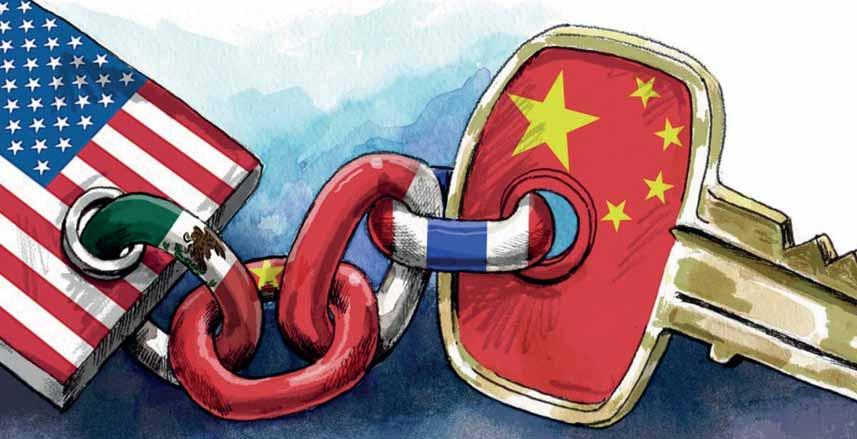
Ultimately, Moscow’s bullying of Ukraine placed Beijing in an uncomfortable spot. Generally, Beijing does not want Russia to lose because that would boost the collective West and perhaps even reverse the process of an illiberal rise globally. Beijing is also concerned about Russia’s adventurism escalating into a larger global conflict, which China would be unable to avoid due to the possible security and economic consequences. In light of these factors, a longterm standoff between Russia and the
West that does not devolve into a “hot war” is most advantageous to China, giving it time to adjust to the new geopolitical realities while the US concentrates on places other than the IndoPacific.
But perhaps the biggest failure was the expectation of the West to fail to mount a concerted effort against Russia. Divisions within the trans-Atlantic community were seen as too fundamental, while Hungary and others were less pliable to common European interests. Moreover, the EU was seen by many in Russia as a defunct organization, an attitude seen well before 2022 when the Kremlin openly denigrated Brussels and did not see it fit for grand geopolitical bargains. The reality proved totally different in the first months after the invasion. The liberal system showed it can sustain itself and mount a definitive counter-attack against the perpetrators. Russia was sanctioned with wide-ranging measures,
which, if not immediately then in the longer run, were planned to cripple Russian economy.
Russian politicians and especially the Kremlin-linked analysts were at pains to explain what went wrong when the war deemed “operation” failed and the “decadent West” mustered resources to help Ukraine.
But the collective West should not think that the longevity of the liberal order is guaranteed and that the authoritarian menace will subside. Minding the limits of the liberal order and understanding the level of necessary adjustment, i.e. what world’s major states are ready to sacrifice and contribute to (re)creating the order, is a key variable to picturing the emerging future world order with the liberal component playing an integral part in it.
In a way, it could be argued that now is an opportune time for liberalism to reconsider some of the aspects of its
global endeavor. First, the West is still powerful, and reforming would not be as much as forceful imposition upon itself, but rather a timely adaptation by the stronger to unfolding changes. Delay or purposeful unwillingness for the change could bring down the entire edifice of the order and undermine some critical aspects of the liberal idea itself. Another motivator behind the change/ adaptation could be the nature of the external challenge liberalism presently faces. New orders are created and reshaped by dominant actors when a major threat to their position arises externally. The rising illiberal threat could cause a major reshuffling in the liberal idea to better confront the challenge. Related to illiberalism is China, which possesses an all-encompassing power to contest the US and its allies to invite them to re-invent the liberal system. Surely, adjusting solely to China and illiberalism would not solve all troubles, as internal remaking is also necessary because the challenge to the order emanates from internal forces too. Indeed the challenge in the form of China could serve as a necessary unifier of liberal democracies, a motivation lacking since the end of the Cold War and the global communist movement. Global terrorism was a consolidator behind America’s and its allies’ efforts in the 2000s, but the threat was not as long-lasting and overarching to serve as a necessary glue for the Western alliances. In contrast, the emergence of China could actually be a necessary motivator for the US and its allies to act together in the face of a rising systemic challenge. China could dissipate worries which accompanied the US’ unipolar position. China’s and Russia’s models of governance could make the minds in the West, intent on universalist drive of liberalism, take a sober view, and curtail global ambitions. After a near relentless liberal march in the 1990s–2000s, the illiberal pushback could help the Western powers sit back, solidify their gains, and produce more effective foreign policy.

GEORGIA TODAY JANUARY 27 - FEBRUARY 2, 2023 4 POLITICS
Illustration: Craig Stephens for SCMP
Image source: idu.org
Emil Avdaliani is a professor at European University and the Director of Middle East Studies at the Georgian think-tank, Geocase.
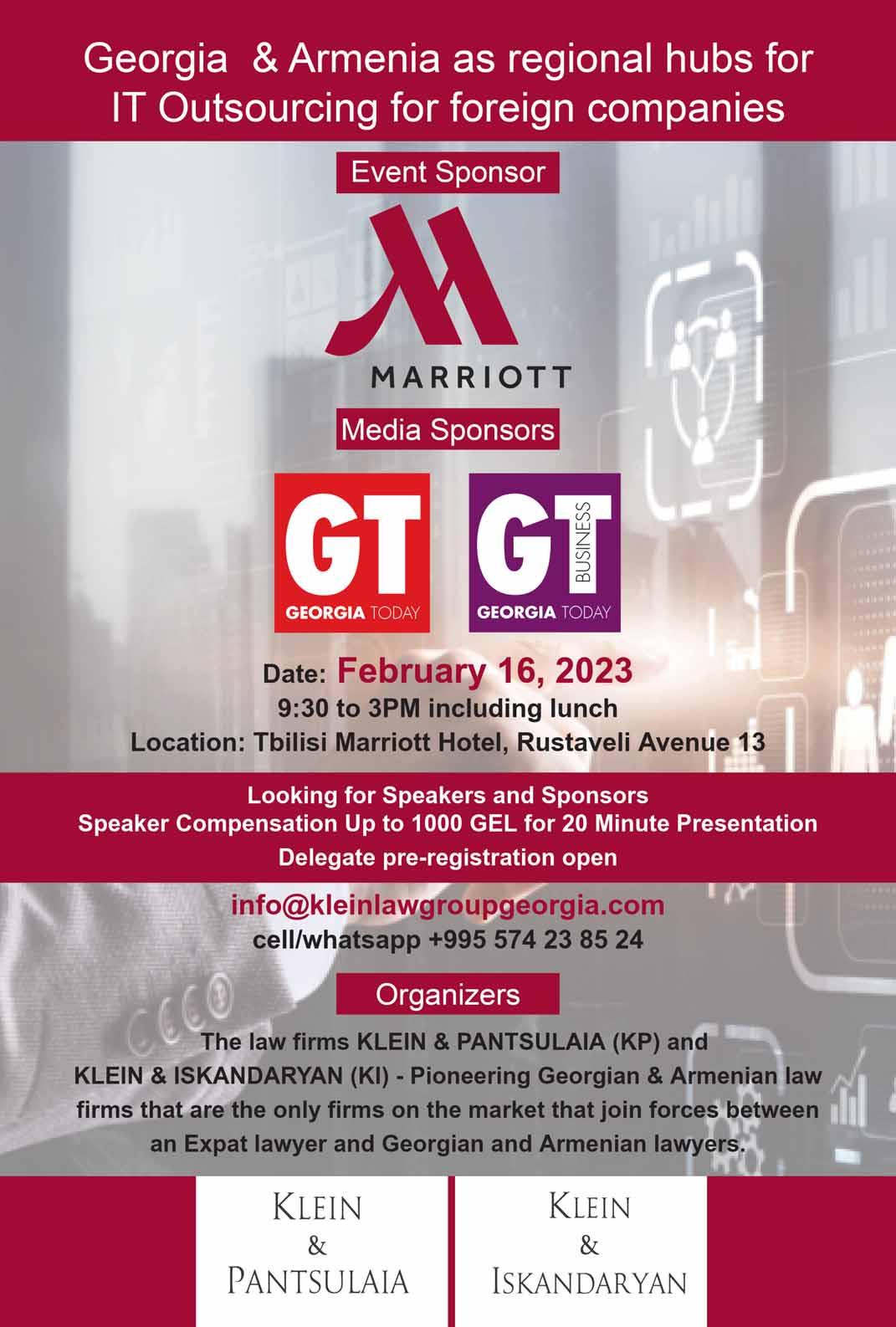
Felshtinsky: “The West needs to understand the only way to end this war is to win it”
Continued from page 1
“But compare this with the help that started to come to Ukraine. Ukraine was not taken by Russia in the way Poland was taken by Germany and the Soviet Union. Ukraine started to fight successfully and help has been coming in military equipment, financial aid, and its refugees being accepted by basically all countries.
“I believe, though, that we might be at the beginning of the Third World War. 24th of February will be written in the next generation of textbooks as the beginning of WW3. Putin leaves us no choice. Europe and the US want to end this war by all means, as quickly as possible, but Ukraine won’t agree to any concessions and Putin doesn't plan to stop anyway. He lost his army after 10 months of war, but the goals of the Russian foreign policy are still the same. He still plans to take control of Eastern Europe and, in the end, to get into a conflict with NATO. He was hoping he’d get what he wanted through bluff and blackmail, but it didn't work. So he started a war, and there are no indications that he's ready to stop it.
IN WHAT WAY WOULD IT BE BENEFICIAL TO HIM TO EXTEND THE WAR BEYOND UKRAINE’S BORDERS? IF HE CAN’T TAKE ON UKRAINE, WHAT CHANCE DOES HE HAVE AGAINST EUROPE, THE WEST, NATO?
We’re looking at this war from a Western, rational point of view: We see him losing battles on the ground in Ukraine, we see him losing first one army in Ukraine, then a second army in September, when he announced the mobilization and the 300,000 people, maybe more, whom he wanted to draft, escaped the Russian Federation before he even ended his speech. Now he's trying to get together a third army. Russia is a huge country; the supply of people is unlimited. The price of human life is very cheap. He will collect this third army, though it will probably take several months.
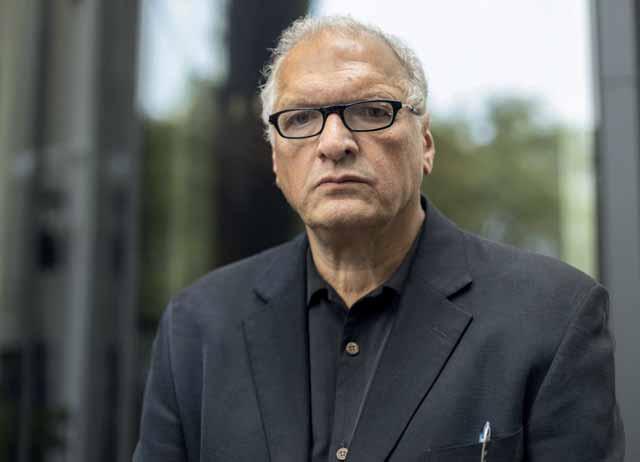
From the point of view of military victories on the ground, Putin lost this war completely. But from Putin’s point of view, the situation is different, since he's allowed to destroy Ukraine from the air. And here, since he really doesn’t care how many Russian soldiers he loses in Ukraine, it's just a matter of time for him before Ukraine is completely destroyed.
From his point of view, he’s not able to lose this war, he’s going to win it, because, in the end, he can always use nuclear weapons. From our point of view, he lost.
From his point of view, he is just starting to win. They already indicated that they might use nuclear weapons against Ukraine, while military officials at NATO already indicated that since Ukraine is not a member of NATO, the US and NATO would not retaliate.
Putin was just in Belarus, and it was not the first discussion between Lukashenko and Putin on nuclear matters: Prior to this trip, Lukashenko visited Moscow and there were some troubling words spoken of cooperation in nuclear projects between Russia and Belarus. If we look at this within the frames of the war, if we take into account that Lukashenko withdrew Belarus from the Non Proliferation Treaty in March; if you take into account that Lukashenko stated a couple of times that Lithuania and Poland want to attack Belarus; if we
take into account the nuclear rhetoric we hear from Putin, Patrushev, Shoigu, Lavrov and Medvedev, I think there is a possibility that Russia will move nuclear weapons to Belarus, which is technically speaking an independent state, and will have the ability to fire nuclear weapons from Belarus at wherever they want. Any retaliation would be against Belarus, but since Belarus is a small state, positioned deeply inside Europe, the West would be unlikely to retaliate against them with nuclear weapons, as radiation might spread across the border. This whole thing opens possibilities which I think are reasonable to be afraid of. And I think this is the only reason Putin left Belarus independent, while he tries to annex every other piece of territory, even those territories which he doesn't control in Ukraine.
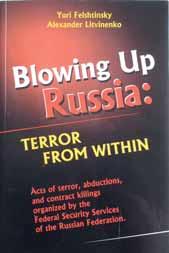
ISN’T GIVING NUCLEAR WEAPONS TO BELARUS NOT A DANGER TO RUSSIA ITSELF IF LUKASHENKO IS EVER THREATENED? AND EVEN IN THE EVENT OF A TACTICAL NUCLEAR STRIKE FROM BELARUS ON UKRAINE, IT COULD VERY WELL AFFECT BELARUS’ OWN TERRITORY. WHY WOULD LUKASHENKO ACCEPT THAT?
Lukashenko is not an independent politician. He is not even an independent dictator. He’s in no hurry to commit suicide. But the same was true about Mussolini. And yet he got involved in WW2 and was very quickly hanged. There are Russian troops in Belarus now. Several agreements were signed over the years between Russia and Belarus in relation to the military activity of Russia there. Russians control the external border of Belarus, have military bases there. Transferring nuclear weapons is why Lukashenko withdrew the country from the Non Proliferation agreement and after stated that he might ask the Russian Government to return the nuclear weapons which were taken from Belarus under the Budapest Memorandum.
We're not talking about Belarus striking Ukraine. For this, Russia doesn't need
Belarus: Russia could strike Ukraine from Russia, we know this. Russia could strike Ukrainian nuclear power stations with conventional weapons, if it wanted, and cause the same level of damage in terms of radiation. When we talk about why from Belarus, we're talking about the idea Putin might have in his mind that they will fire from Belarus into countries like Poland and Lithuania with nuclear weapons.
AGAINST NATO MEMBER COUNTRIES?
Precisely. If NATO retaliates against Belarus, that’s fine with Putin- it’s not the Russian Federation and he doesn’t really care. What he cares about is that after this has happened, he will be able to ask the leaders of France, Germany and the United States the same question: Are you ready to continue with this war or are you ready to capitulate?
SO FAR THE WEST HAS GONE OUT OF ITS WAY TO ENSURE THAT THIS WAR STAYS CONTAINED WITHIN UKRAINE’S BORDERS. YOUR SCENARIO SUGGESTS THAT ALL THESE ATTEMPTS HAVE BEEN FUTILE. SO WHAT SHOULD THEIR ACTION PLAN BE?
This war would end as soon as NATO decided to engage in it openly. If this happened, there would be a chance to stop the war in Ukraine. It has become clear that the Ukrainian army is so strong they don’t actually need NATO’s ground forces, but they do need offensive weapons. And they will only win this war if they start firing into Moscow, but for this they have to have particular weapons and these weapons come from the West. The idea of the West is not to provoke Putin to escalate – but, indeed, what the West is doing now is provoking Putin to escalate; what the West is doing now is allowing Putin to destroy Ukraine from the air. And if Russia is allowed to do this for the next several months, the Ukrainian army will be alive, but the country will be destroyed entirely. And from Putin’s point of view, he’s going to
win this war, because he’s going to ruin this country, and then he’ll move further, probably on to Moldova.
We should watch Belarus because that's where Putin will try to make the second attempt to take Kyiv from. This is probably going to happen in the first quarter of 2023. This is a territory from which, theoretically speaking, Russia would be able to strike with nuclear weapons. Russia won’t plan to strike with nuclear weapons from the territory of Russia, because this will be suicidal, because then NATO would respond against Russia. If the strike is conducted from Belarus, trust me, no one is going to respond against Russia- the West would do everything to avoid a nuclear war with Russia. Now since speaking about escalations, since day one we have heard from Putin the same phrase: “If you do this or that, you will escalate the level of this war.” And we crossed that line many times. And Putin is not, as we see, using nuclear weapons. I do not really believe there is a particular red line [for Putin] which the West might cross.
EVEN BOMBING MOSCOW WOULDN’T BE A RED LINE FOR HIM?
If this bomb comes from Kyiv, I think it’s within the rules of war. Is Putin going to resort to nuclear war if the Ukrainians were to take down the Ostankino TV center? I doubt it. If he wanted to destroy Ukraine with nuclear weapons, he’d not have lost his army in Ukraine, he’d just have used nuclear weapons against Ukraine from the start. Will he use nuclear weapons if the Ukrainians really start winning this war?
We’ll see. But the problem with this is that if we assume that Putin, when he realizes that he’s losing the war, chooses to use nuclear weapons, then we must allow him to win the war in order to avoid this scenario. It's a very gray area, and so we take our chance with nuclear weapons, we take our chance with the possibility of nuclear strikes, because we do not honestly have choice, because the only choice which Ukrainians have to avoid is capitulation. And after what's
been happening for the last 10 months, Ukraine is not going to capitulate, even if Russia uses nuclear weapons against it. And then, for countries like France and Germany, the most important part is to avoid war, and if Ukraine is taken completely by Russia, I don’t think they will complain. It would be better for them than what's happening now. And that's why you see from time to time publications from respected people like Kissinger, saying that when the Soviet Union existed, and the wealth was divided between West and East, everything was fine; it was a comfortable situation. When the Soviet Union collapsed and Eastern Europe got its independence, those countries knew they would rather die than become part of the Soviet empire again. That's what Putin miscalculated with Ukraine. That's what everybody miscalculated with Ukraine. And this is a new reality, and countries like France, Germany, the United States need to face reality and understand that the only way to end this war is to win this war. And thanks to the Ukrainians, we have the ability to win. At this point, Ukraine has the strongest army in Europe. NATO doesn't have an army like Ukraine’s in Europe. The Ukrainians are ready to fight; the Ukrainians are ready to die. And they have territory to fight in, because even if the Baltic states were ready to fight, they really don’t have territory to do so, and they do not have the population to involve.
It's a great advantage that we have Ukraine on our side. And all we need to do to keep this war within Ukrainian borders is to give Ukrainians the ability to win this war. Because if they're not able to win this war, then Europe will lose. Ukraine is the only fighting power in Europe. And if the West somehow allows Ukraine to be taken by Putin, it wouldn’t stop the war. It will expand the war into Moldova. And as soon as they're done with Moldova, they will expand the war to the Baltic states, then enter Kaliningrad at the German border, and Eastern Europe by that time would be encircled by Russians and will enter under Russian control. That was the plan in February 2022, but this plan was ruined by the Ukrainians. That’s why the West has no choice now.
OF THE 2008 WAR, YOU WRITE THAT “IT WAS TOO COMPLICATED FOR THE WEST TO UNDERSTAND. AND THEY DID NOT PAY ANY ATTENTION.” PERHAPS “DIDN’T BOTHER TO PAY ATTENTION” WOULD BE A MORE PRECISE DESCRIPTION?
Yes, and of course they should have. If sanctions of the level of 2022 had been introduced back in 2014, there would not have been a 2022 invasion. And if sanctions had been introduced against Russia in 2008, there would have been no 2014 annexation of Crimea. All this happened because Putin, like a small child, was testing the waters. And when he realized that he was allowed to go unpunished for the invasion of Georgia in 2008, he knew he might go unpunished for the invasion of Ukraine in 2014. And he was right. The resulting sanctions were minor, and everything stayed the same, and everybody kept smiling at him, eating with him, shaking his hand. So that's why the invasion of 2022 happened.
AND THEN, SUDDENLY, THE WATERS BECAME TOO DEEP. The waters became too deep.
GEORGIA TODAY JANUARY 27 - FEBRUARY 2, 2023 6 POLITICS
Yuri Felshtinsky. Source: elperiodico
Hidden Treasure: XVII Century Wine Bar-Restaurant Archive in Old Tbilisi
origin (province), and through the wine tour the visitors will discover not only Tbilisi but the entire Georgia. In addition, in the "Archive" you will come across with rare aged wines.
HOW MANY WINES ARE PRESENTED IN YOUR CELLAR AND HOW DID YOU PICK EACH OF THEM?
We have 550 different varieties of grape wine and we are trying to increase that number. We want to use the existing assortment as much as possible and to offer our guests a wide range of choices. However, it is possible to find a new variety of wine made, but it might fail to meet the criteria.
First of all, the wines are tasted, then they are ranked based on the tasting process and some are subsequently eliminated. Not all wines can reach our standards.
WHAT CRITERIA ARE YOU REFERRING TO?
Mainly, organoleptic characteristics.
BY MARIAM BOKERIA
Wandering around the old Tbilisi streets the one can easily notice a large medieval building next to Sioni cathedral. Qarvasla an ancient bazar a caravansary was built in XVII century during the reign of King Rostom. More than a three centuries old Qarvasla holds a lot of interesting history and culture inside. Nowadays the aura of that time can still be felt in the walls of caravansary but with wine and delicious tradi-
tional snacks. Today, wine museum and wine bar restaurant Archive will remind you the 19th century Tbilisi with nostalgic and cozy, pleasant vibe. The Georgian chef Levan Kobiashvili researched the historical books and travelled around Georgian regions and villages to collect the old unique receipts about the traditional snacks and dishes to offer us the brilliant exquisite variations of his signature snacks (khemsi) and plates.
Collaboration of two professionals, chef Levan Kobiashvili and the best sommelier Jaba Dzimistarishvili offers the restaurant guests a unique opportunity - to taste hundreds of Georgian wines of different varieties with the appropri-
ate Khemsi and to comprehend the subtle details in the taste of traditional Georgian wine as well as traditional Georgian snacks.
Georgian khemsi is made with organic ingredients which are harvested and grown in local farms around the country. Wine bar and restaurant periodically offers both Georgian and foreign guests the opportunity to experience the Georgian tradition of Nadimi with various theatrical performances.
As Jaba Dzmistarishvili notes, the main focus in "Archive" is on Georgian wines. Their entire cellar consists of classic, as well as kvevri and planted wines of Georgian. Each wine carries history of its own
AS WE KNOW, WINE IN YOUR RESTAURANT IS MUCH CHEAPER THAN IN OTHER RESTAURANTS. IN ADDITION TO THE PRICE, HOW DO YOU DIFFER FROM COMPETITORS?
Our concept does not just include a restaurant. There is a wine museum and a shop. Even in the restaurant itself, the prices of wine are quite low. In fact, our restaurant wine can be purchased at the retail prices. This is an unusual phenomenon for the Georgian market. In addition to the price, our restaurant has far bigger selection of wine and of course Levan Kobiashvili's cuisine is what distinguishes us from competitors.
BESIDES WINE TASTING AND PURCHASING, WHAT ELSE DO YOU OFFER THE CUSTOMER
TO
GET TO KNOW
THE GEORGIAN WINE CULTURE?
As I told you, we have a wine museum where the entire history and culture of wine is presented to the guests along with historical artifacts. In addition, we have tastings through which guests can taste wines from all over the world.
WITH YOU, THE CUSTOMER WILL TASTE THE WINE WITH THE APPROPRIATE KHEMSI. WHAT IS THE SPECIFICITY OF SERVING WINE WITH KHEMSI?
In general, the cooperation of chef and sommelier means wines pared to the dishes. The wine should not spoil the dish and the dish should not overpower the wine. Matching is very important. Neither food or wine should be wasted. Levan and I are sitting and pairing different wines with different dishes. This is how the menu was created.
IF YOU CAN
EXPLAIN,
WHAT KIND OF WINE PAIRS WITH WHAT KIND OF KHEMSI?
For example, Our Khemsi Boards include Nutty Pkhaleuli and Ghandzili. A slightly full-bodied, relatively high-acid, Western Churi wine goes very well with nutty dishes. We also have a board of Georgian Khamoni and Georgian ham, to which we can serve a full-bodied red wine. For any wine, we can select the appropriate menu that will fit it perfectly.
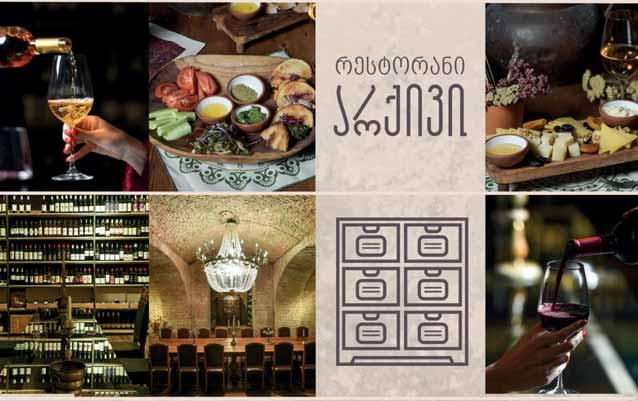
HOW DO YOU RATE WORKING WITH LEVAN?
He gives me a lot freedom in the kitchen. I have the best MasterChef in Georgia and we can go a long way together. You cannot change the structure of the wine, it is bottled and formed, but we can change the specific ingredients in the course so it complements the wine as much as possible.
Bpand British Council Award Georgian Journalists
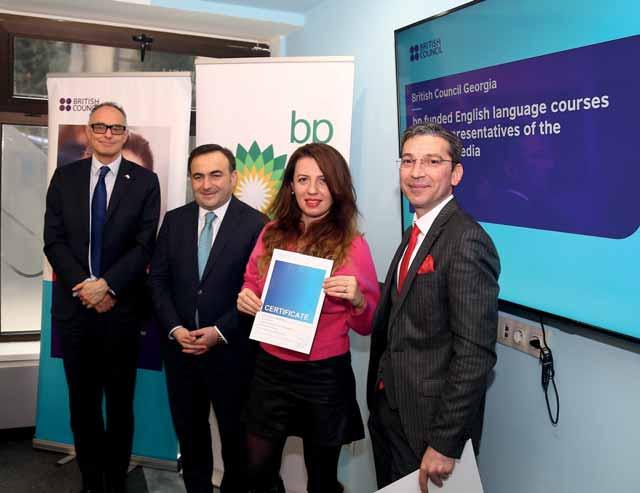
British Council Georgia and bp are proud to announce another successful completion of the bp Georgia initiated and funded English language program for representatives of the Georgian Mass Media.
For more than a decade, bp Georgia has funded English language courses for journalists representing an array of media sources and covering topics ranging from Art and Culture to Business and Politics. British Council has helped hundreds of representatives of the Georgian Media to improve their verbal and written communication skills in English and thus do their jobs more efficiently and advance their careers.
During the academic year 2021-2022, the project provided journalists with an online and flexible course that allowed them to effortlessly balance their personal and professional commitments.
In addition to General English lessons, British Council provided “myJournalism” sessions that focused on specific language structures important to the course participants' professional demands, as well as giving them an opportunity to talk and write about current events and themes of interest.
Testimonials from the course participants highlight their experience of British Council’s English course and their takeaways.
Tekla Adamia: “This course was a great
opportunity for me - challenging and interesting at the same time. It helped me to analyze my insecurities about the language and improve my English, especially on the communication level. I’d been avoiding international training and workshops for years only because I was doubtful of my language skills, but this course changed so much about that. Participating in the course altered my attitudes toward many aspects of my professional life. I owe my thanks to this course for an amazing international summer media school in Greece and scholarship for the training. Had I not been practicing my English here, I would never have made it to that media school and thus would never have had the opportunity. The most important part about the course is that it gave me motivation to not stop, to work on my weaknesses, and to improve my skills even independently.”
Rusudan Gvazava: “I would like to thank bp Georgia for the invaluable support it provided us by funding the English language courses through MyClass lessons and MyJournalism sessions at British council Georgia for Georgian Journalists. I would like to express my deepest gratitude and appreciation.”
Maka Bibilashvili: “The English language course was truly amazing. It was a great experience for me and thank you for this opportunity. I very enthusiastically participated in every session, and the online classes were also engaging.”
GEORGIA TODAY JANUARY 27 - FEBRUARY 2, 2023 7 BUSINESS
Trends among Int’l Visitors to Georgia in the Third Quarter of 2022
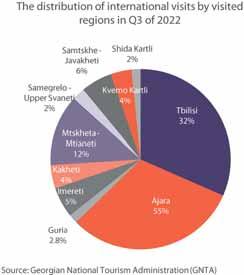
pandemic figure. It must also be noted that in Q3 of 2022, the share of visiting friends and relatives in total visits was similar to the prepandemic figure, while in the first half of 2022 it showed a significant increase (6.1 pp). When looking at the conducted activities, the top activities were tasting local cuisine and wine (83%), sightseeing (61%), and shopping (58%).
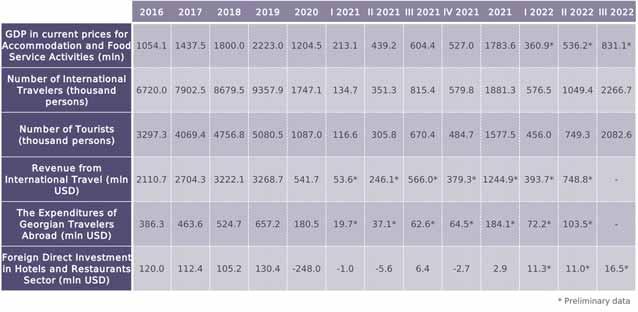
Similar to the first half of 2022, the share of visitors going to the beach increased considerably compared to the pre-pandemic period.
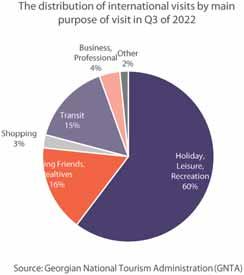
The number of international travelers increased by 160.4% in November 2022, compared to the same period of 2021, and declined by 29.7% compared to the same period in 2019. Meanwhile, the number of international visitors increased by 150.5% (2022/2021) and declined by 23.2% (2022/2019), and the number of international tourists increased by 97.9% (2022/2021) and declined by 11.6% (2022/2019).
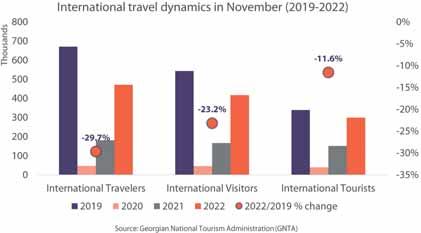
In November 2022, the top countries of origin of international visits were Russia (108,247 visits), Turkey (101,940 visits), and Armenia (71,785 visits). Among the major tourism markets, the number of international visits from Belarus (84.4%), Russia (24.7%), Turkey (24.7%),

showing signs of significant recovery, with a notable acceleration in Q3 of 2022 when the number of international visits reached 69% of the corresponding figure in Q3 of 2019. In the third quarter of 2022, similar to previous periods, most international visits were from neighboring countries: Russia (28% of total visits), Armenia (17%), and Turkey (15%). However, notably, in Q3 of 2022 compared to Q3 of 2019, the share of Russians in total visits increased by 9 pp. Compared to Q3 of 2019, in Q3 of 2022, among the main countries of origin of tourists, international visits from Russia exceeded the pre-pandemic number by 4%. Meanwhile, visits from Israel (96% of the value in Q3 of 2019), Iran (93%), Armenia (71%), Turkey (69%), and Ukraine (69%) also recovered significantly.
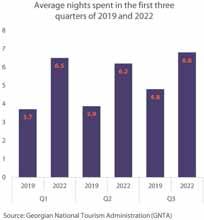
During Q3 of 2022, the share of international visitors going to Adjara increased sharply by 12.7 pp compared to the pre-pandemic period. On the other hand, visits to the Kvemo Kartli region declined considerably (by 7 pp), similar to the first half of 2022, which could be attributed to the closure of the land border with Azerbaijan.
HOTEL PRICE INDEX IN GEORGIA
In November 2022, in Georgia, the hotel price index decreased by 6.6% compared to September 2022. The 3-star, 4-star, and 5-star hotel price index decreased by 6.1%, while for guesthouses, the price index decreased by 8.3%. The monthly HPI was the highest in Samtskhe-Javakheti (7.5%) and the lowest in Guria (-16.3%).
In November 2022, compared to November 2021, hotel prices in
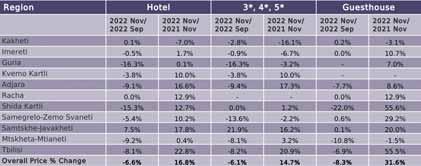
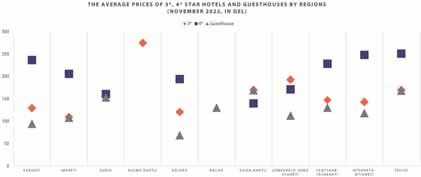
Georgia increased by 16.8%. The prices of 3*, 4*, 5* hotels increased by 14.7% and the prices of guesthouses increased by 31.6%. The yearly HPI was the highest in Tbilisi (22.8%) and the lowest in Kakheti (-7.0%).
THE AVERAGE HOTEL PRICES IN GEORGIA
In Georgia, the average cost of a room in a 3-star hotel was 155 GEL per night in November 2022, while the average cost of a room in a 4-star hotel in Georgia was 233 GEL per night and the average cost of a room in a guesthouse was 114 GEL per night. The average cost of a room in a 5-star hotel in Georgia in September 2022 was 419 GEL per night. In Kakheti, the average price was 575 GEL, followed by Tbilisi – 554, Guria –381, and Adjara – 344.
Analysis provided by PMCG Research
and Israel (15.8%) significantly exceeded the pre-pandemic figure (November 2019). Besides, the number of international visits from other neighboring countries: Armenia (-38.5%) and Azerbaijan (-89.2%) was still well below the pre-pandemic number. The low recovery rate of visits from Azerbaijan could be attributed to the closure of the land border between Georgia and Azerbaijan since March 2020.
INTERNATIONAL VISIT DYNAMICS
Since 2021, international visits have been
Despite only a partial recovery in the number of international visits, in Q3 of 2022, the total expenditure of international visitors exceeded the pre-pandemic (Q3 of 2019) value by 41%, reaching GEL 4.6 billion. The average expenditure per visit tripled in Q3 of 2022 compared to Q3 of 2019 and reached GEL 2,440. This could be explained by a combination of factors, such as the increase in the average number of nights spent per visit, inflationary trends, and other changes in travelers’ behavior. In Q3 of 2022, a large share of the expenditure of international visitors went on accommoda-
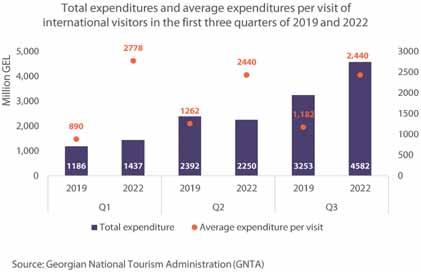
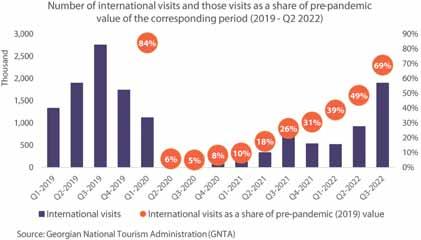
tion (40.9%), followed by food and drinks (29.8%). Notably, the share of accommodation in total expenditures increased by 16.3 pp compared to Q3 of 2019. Apart from that, the share of food and drinks declined significantly when compared to the first half of 2022 (36%).
PURPOSE OF INTERNATIONAL VISITS
Similar to the first half of 2022, the average number of nights spent per visit increased significantly (42%) in Q3 of 2022, compared to Q3 of 2019, reaching 6.8 nights. Apart from the general postpandemic changes in the behavior of visitors, this could also be attributed to the fact that a larger share of visitors are choosing a personal home or apartment as their accommodation (12 pp higher in Q3 of 2022, compared to Q3 of 2019). Observing the distribution of international visits according to the main purpose of the visit, in Q3 of 2022, the share of leisure/recreation in total visits increased by 7.5 pp compared to the pre-
GEORGIA TODAY JANUARY 27 - FEBRUARY 2, 2023 8 BUSINESS
BIM Solutions Georgia - International Standard of Construction Project Management in Georgia
BY MARIAM MTIVLISHVILI
With the development of construction technologies, the implementation of BIM has become a necessary standard for the architecture, engineering and construction markets in most EU countries. BIM is a digital model or prototype of a building that integrates information about all building elements in one space. BIM Solutions Group has been using and implementing the aforementioned innovative methodology in the Baltic States since 2011, and now it is actively continuing its work in Georgia with its group member company BIM Solutions Georgia. BIM Solutions Georgia helps designers, contractors and project owners plan and execute construction projects more efficiently. Consequently, organizations that use BIM significantly save time and money while continuously improving the quality of construction.
BIM Solutions help clients/users reduce many problems and financial loss in construction, including delays, waste of materials, repetitive work and project quality. BIM Solutions Georgia advises project stakeholders on internationally proven practices in design, construction, building maintenance and supervision. As a result, customers get a more controlled and efficient construction project.
Currently, architects in Georgia use such BIM technologies as ArchiCAD and Revit for architectural design. BIM Solutions Georgia believes that this is a very good start, as it significantly increases the pace of design work and makes vis-
SOCIETY
ualization more efficient. In addition, architects are given the opportunity to automatically create drawings from BIM models, calculate the amount of materials, and more. However, if we want to get perfect results in the construction process, each part of the design should be created in the BIM program itself. In this process, BIM Solutions Georgia provides full support to architects, designers, engineers and other involved parties and offers consultations with industry specialists at every step.
In order to train companies, BIM Solutions Georgia has organized the first workshop related to structural engineering. During the event, a specially invited guest from Lithuania, a representative of the engineering company Sostines Konstruktoriai, will show the audience a new way of construction engineering, and best practices, through the use of BIM technologies. The event will be held in Tbilisi at Radisson BLU Hotel on February 15 at 15:00, and will be open to any interested person, including structural engineers and designers working on the design of reinforced concrete structures, BIM users and project managers. Based on BIM design principles, the design workflow of reinforced concrete structures will be presented. Workshop participants will see how fast, accurate and efficient the design process can be using modern software tools. Interested persons can register on www.bimsolutions.ge
“BIM Solutions Group believes that its experience and more than 10 years of practice will help the Georgian construction industry to reach a higher level of international and European standards in modern construction management,” says Vytautas Puodziunas, Director of BIM Solutions Georgia. “Our goal is to
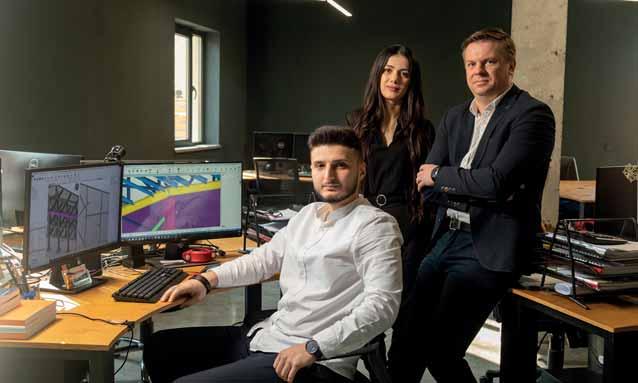
take construction and project management to a new level by enhancing quality and efficiency”.
“Today, BIM is mandatory in most developing countries and Europe. The governments of Estonia, Latvia and Lithuania have already decided to make BIM solutions mandatory in construction projects. Sooner or later, the use of BIM will become necessary in Georgia as well, that's why we help all parties involved in this process, including government institutions, to be ready to meet these changes and international standards.”
Vytautas Puodziunas, a Lithuanian MEP engineer and qualified construction pro-
ject manager with extensive experience working on international projects, has for more than 15 years been actively cooperating with local and world leading companies. He never stops learning and aside from his professionalism, he constantly tries to improve and develop his qualifications. The director of BIM Solutions Georgia has been living in Georgia for over 12 years and shares his experience with companies on all phases of a complete construction project, including planning, design, construction and supervision. He is always looking for talented personnel in Georgia and beyond, and offers the opportunity to cooperate with an internationally rec-
ognized company. BIM Solutions Georgia team members consider Vytautas Puodziunas to be a passionate and dedicated person who has brought up many students and made them fall in love with their work.
With regards future plans, Puodziunas says, “2023 will be a year for the promotion and education of digital construction with the BIM process. We are planning several events to this end. We hope BIM Solutions Georgia will become the leading BIM consultancy company in Georgia, helping companies and specialists, universities, associations and governmental institutions implement a new BIM approach and related standards.”
Trouble in Gudauri: “Mafia” Opposes Foreign Workforce
the instructors.
“They're pushing foreign ski instructors off the slope, taking their equipment, standing between them and their clients and refusing to move,” he states, adding that they had blocked access to the gondola carriages that carry guests up the mountain. Declaring that "Gudauri is for Georgians,” these men have largely halted one of Georgia’s most important seasonal industries. With an estimated $1 million in revenue each season, more than a good time on the slopes is at stake.
taurants, and we partner with a local rental shop.
Before this year, we felt welcomed overall, although we’ve always felt some resentment from this local “ski mafia”. In the past, they caused a lot more trouble for the Ukrainian and Russian instructors and ignored EU/US instructors, but now the target has become all foreign citizens.
ism sector.
EXCLUSIVE
INTERVIEW BY
MICHAEL GODWIN
The pristine white slopes of Georgia’s famous ski town of Gudauri are beloved to a host of international outdoors enthusiasts. The cold winter months routinely bring armies of both professionals and amateurs, eager to enjoy one of the nation’s most exhilarating natural attractions. Additionally, the businesses that cater to these masses play a vital role to both the country’s tourism industry and the local economy. However, this season is seeing the beautiful slopes marred by gangs of young men, outraged at the presence of outsiders. Despite the local and national economy rocketing back from pandemic levels, these groups are outraged at what they perceive is a lack of action from the government, action the aptly dubbed “ski mafia” claim should be to outlaw the role of foreigners in this vital tour-
A member of the Vagabond Adventures winter sports company who has witnessed their actions and had customers harassed by these gangs, is part of one of the six skiing schools on the mountain. Comprising a team of both local and foreign winter sports professionals, he has taken action to protect his clientele and employees. However, despite reporting the ongoing incident, the police have neglected to take action, stating they can only act after an injury occurs.
“We went to the police to ask for protection, but they told us that the group is out of control and they can't do anything preventative,” he says, speaking on the condition of anonymity due to the pressure on the staff. “They can only act after someone gets injured. Now we want to go to the media, raise support among the rest of the people living in Georgia, and show that this group of thugs doesn't speak the opinion of the whole country.”
According to him, the groups have yelled obscenities at families attempting to board the ski lifts and have even assaulted
With over 100 foreign instructors from the United States, the European Union, Russia, and even Ukraine, the local industry thrives on foreign talent. Complimenting this is the vast hospitality and supporting business infrastructure that makes Gudauri the lauded resort town for which it is famous. The situation, the ski company member says, has caused long-time clients to question their winter traditions, which will potentially take a toll on the larger economy.
Following the arrival of more police, and formal reports filed, the action has recently calmed, but not abated. The member of Vagabond Adventures only asks that they find dialogue, and potentially work together. Speaking with GEORGIA TODAY, he explains some of the ripple effects and the situation around the incidents, as well as what he hopes can be achieved in the near future.
THE AREA IS A HUGE TOURIST ATTRACTION FOR BOTH FOREIGNERS AND GEORGIANS ALIKE. HOW WOULD YOU DESCRIBE YOUR AND THE COMPANY’S RELATIONSHIP WITH THE LOCAL COMMUNITY?
We have a great relationship with many of the Georgians who live and work here during the season, it is only one specific group that is causing trouble. On our team we have nine Georgian instructors and guides. In our package trips, we also use local drivers, accommodation, res-
THERE’S CERTAINLY AN ARGUMENT THAT THE GOVERNMENT HAS SOME RESPONSIBILITY TO PROVIDE MORE EMPLOYMENT OPPORTUNITIES FOR LOCAL WORKERS. HAS THERE BEEN ANY EMPLOYMENT ISSUES IN THE LOCAL INDUSTRY?
I would argue that the government has some responsibility to provide more training opportunities for locals to gain a competitive advantage in the local industry. As Gudauri is growing so quickly, it seems that work has been plentiful in general, but it’s certainly more abundant for those with professional training and online marketing skills. This year is an exception, as only a small fraction of the ski area is open due to dry weather, and paragliding has been banned. Paragliding pilots are now out of a job indefinitely, and all other businesses and their employees will be hurting until more snow comes.
THIS HAS OBVIOUSLY HAD A NEGATIVE EFFECT ON THE WINTER SPORTS SCHOOLS AND EQUIPMENT BUSINESSES. HAVE YOU SEEN THIS TAKE A TOLL ON THE OTHER HOSPITALITY INDUSTRIES IN THE AREA, AND HAVE THEY SAID ANYTHING?
It affects all businesses in Gudauri because tourists are canceling their trips and Gudauri is getting the reputation as a corrupt and dangerous place. People are not only canceling ski lessons, but entire
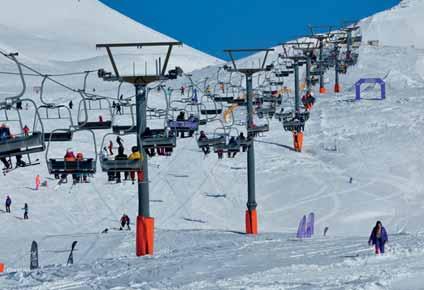
families and groups are canceling their trips to Georgia and going to other countries instead. Many of our clients have been coming back year after year because they love skiing with our instructors. When they cancel their trips, it also affects the hotels and restaurants and drivers that they have been using every year, and it harms the large number of qualified and professional Georgian instructors who now have a bad reputation because of this. At least one restaurant and the Gudauri Business Association have spoken out about their loss of clients, condemning the aggression.
IT SEEMS THE ISSUE IS NOT IMMEDIATELY RESOLVABLE WITHOUT SOME TYPE OF SHARED DIALOGUE. HOW DO YOU SEE THIS PLAYING OUT AND WHAT IS YOUR DESIRED END STATE?
I believe that being registered as a business in the Public Service Hall in Tbilisi and having internationally-recognized qualifications and language skills should be enough to be allowed to work in Gudauri, and if someone disagrees, that’s an issue to take up with the government, not with violence on the slopes. Dialogue thus far has proven very difficult, so in the near term I hope that the police will do their job in enforcing peace on the slopes so that our clients will feel safe. I believe that once all sides can come to the table with compassion and see each other as humans, we’ll be able to come to an agreement.
There will be more than enough work to go around when the ski resort fully opens, and it can be distributed evenly if each company markets to their niche. In my idealistic future, I’d like to see these local “mafia” guys organize themselves into a company and compete in skills rather than in violence, and I’d be happy to offer my experience to help if anybody is open to receiving it. I love Gudauri and want to see it improve.
GEORGIA TODAY JANUARY 27 - FEBRUARY 2, 2023 9 BUSINESS
The popular skiing slopes of Gudauri, northern Georgia. Photo by Giorgi Nikolava
Open & Shut Case
BLOG BY TONY HANMER
The day has finally come… when I close my old, creaking, barely functioning laptop and open the brand spanking new Apple MacBook Pro which arrived earlier this month. This will get a bit technical, so if it doesn’t interest you, I forgive you for not reading on.

The two machines both have 16 GB of RAM memory, but they could hardly be more different. Apple is known as the favored brand of designers, among whom I count myself. But its expense, plus the expected agony of many days’ switchover in small increments, delayed me for some years. Now, however, the old PC really is showing its age (dual I3 processors, PLEASE). My larger and larger photos are becoming too much to open or edit on it, and it frequently freezes up or crashes with the unreasonable demands I tend to make on tech hardware and software.
A windfall from some friends clinched things for me, a gift large enough to cover the purchase price. So I jumped in, ordering it online. Some annoying hiccups later, it was delivered to someone in the
USA who brought it here for me, saving me about $1000 and a month getting it here (sorry). While it’s only a 13-inch model, smaller than the 15-inch Lenovo I’d been using, it is sleek, beautiful, and benchmarking 50-100 times faster. Wow. What a difference 7 years or so can make in this computing universe.
I have used friends’ Macs before, so I wasn’t coming into this totally inexperienced. The new mouse has its whole upper surface scrollable-on, instead of any wheel or such, earning its new designation of Magic. I began calmly listing and the Googling all the things I didn’t know how to do on the new machine, instead of bothering friends with them.
The painful part, I knew, would be the transfer or replacement of many different kinds of software, which I had to list as they occurred to me. A word processor to write these Georgia Today articles on! (Pre-installed, no surprise, but it took a bit of persuading to open my old PCstyle Word files). But what’s the keystroke combination to jump to the start or end of a line of text? Where do I find the word count? Still many little things to learn and memorize!
Photoshop: (I wanted to use an “em dash” there, not a colon, but haven’t found it yet) Here I was most frustrated
to find that any replacement for the old version I had bought outright is now available by subscription only. Grrr, Adobe! Laughing all the way to the bank, are we? But being that this is a program I use practically on a daily basis for photo and other image editing, I have to justify the ongoing expense. Plus, the very latest version can do SO much more than my 2015 one could… “Enhance image!” no longer sounds like what Harrison Ford was doing in the original Blade Runner film. (’cept HIS computer was peering around corners in photos, which, well, we’re not quite there yet).
Actually, one of the smallest programs I had trouble with was the installer for my roughly 18-year-old Magti modem, for which I bought all the old batteries I could find as they’re not made anymore.
I LIKE this little USB-powered thing, and using it means I can get internet anywhere that Magti operates in Georgia, without having to rely on my phone for this (though the phone remains available as a backup). I went to the considerable trouble of Googling how to run Windows programs on a Mac, downloaded a program to do this, set it up badly on the Mac, and then discovered that in this case it won’t be necessary at all. The modem broadcasts its Wi-fi signal as long it’s powered, not necessarily
needing to be plugged into a computer at all. Fine.
Fractal programming I only do rarely now, but that has been firmly Windowbased until now, using FractInt, which started life in the MS-DOS era (ALL commands and functions by keyboard only) and was eventually ported clunkily but more and more fully functionally to Windows. Mac, not yet.
Skype or equivalent… ditto for a password manager, VPN, web browser and various specialized photo-editing programs which can do what not even Photoshop can.
Today, January 21, 2023, was the day I
copied over all my open Firefox tabs, plugged the modem into the new Mac, opened Pages instead of Word, and wrote this, with my old laptop powered down. We have arrived.
Tony Hanmer has lived in Georgia since 1999, in Svaneti since 2007, and been a weekly writer and photographer for GT since early 2011. He runs the “Svaneti Renaissance” Facebook group, now with nearly 2000 members, at www.facebook.com/ groups/SvanetiRenaissance/ He and his wife also run their own guest house in Etseri: www.facebook.com/hanmer.house.svaneti
165 Works from around Georgia and 33 Eco-Letters of the Georgian Alphabet Created by School Pupils
At the end of last year, the organization Keep Georgia Tidy (KGT) proposed to school pupils the idea of creating a joint EcoAlphabet and a special environmental competition. According to the rules, the pupils should come up with a word related to environmental protection and ecological threats, or an environmental message for each letter and draw a relevant image. As a result of their joint efforts, the first Eco-Alphabet was created, with the participation
165 Georgian pupils.
According to the terms of competition, the authors of the best works were identified. School pupils from Racha – Lechkhumi and Kvemo Svaneti, Guria, Samegrelo-Zemo Svaneti, Imereti, Kvemo Kartli, Shida Kartli, Kakheti and Tbilisi were given special, environmentally friendly gifts from KGT partner organizations Tene and Oriflame.
"We are constantly thinking about how to involve schoolchildren in environmental educational activities,” Elene Loladze, Project Manager at Keep Geor-
gia Tidy, tells us. “A proven approach for this is to create a variety of environmental competitions in which children participate with great joy. Students from all over Georgia participate in the activities we offer and present truly different solutions to environmental issues. Our eco-alphabet competition, on which the students worked with great enthusiasm, is a proof of this. Together with them, we were able to create a Georgian ecoalphabet, which will be a good helper for schools and kindergartens so that students can get more knowledge about
environmental care and protection.”
As a result of the competition, a digital version of the unified eco-alphabet was printed as a poster, which is available to view, download and use by all interested kindergartens and schools. Head over to the website of KGT ecolog. online or contact the organization on Facebook.
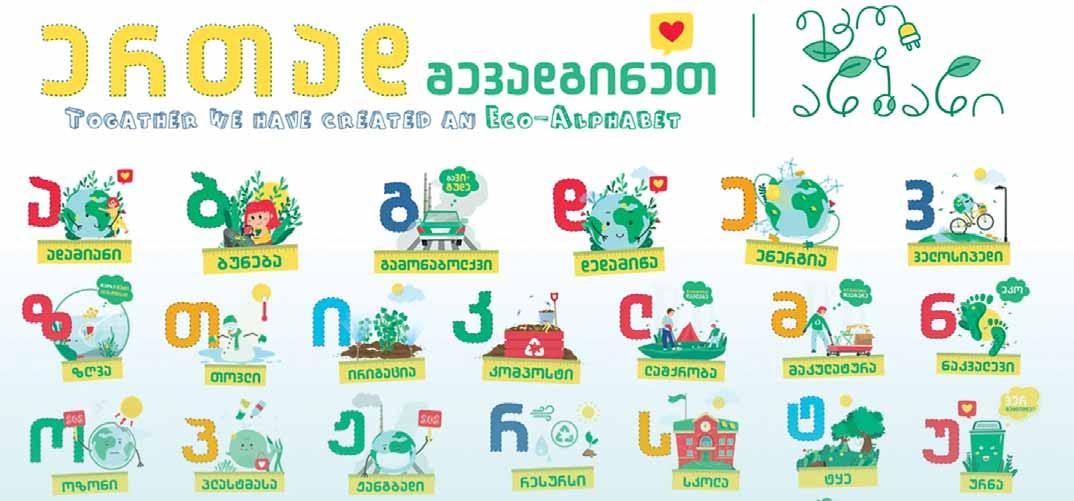
One of the main directions of the organization Keep Georgia Tidy is the development of environmental knowledge and skills among students. Therefore, in 2020, KGT became a local rep-
resentative of the Foundation of Environmental Education (FEE) in Georgia, and, in cooperation with it, implements the international program of Eco-Schools. The project is run with the financial support of the Swedish government with the involvement of both local and international partners. In close cooperation with the ministries of Environmental Protection and Agriculture (MEPA), Education and Science (MES), and the Center for Environmental Information and Education (CEIE).
GEORGIA TODAY JANUARY 27 - FEBRUARY 2, 2023 10 SOCIETY
Anita Rachvelishvili Stars in Samson et Delilah at the Berlin Staatsoper. Berlin Theaters in a Glimpse
sake of others in rage and as revenge.
The final showdown, although less spectacularly staged as one would hope for, shows a stark rupture. The contrast itself between the Philistines with their ludicrous ritual dances and orgiastic festivities, as opposed to the bareness and sufferings of the Israelites, creates a deep opposition all wonderfully rendered in Camille Saint-Saëns timeless music. The composer himself considered this opera as one of his main works. It has a complicated history, since its biblical story has presumably been one of the main obstacles in its staging at the Paris Opera House. Camille Saint-Saëns was a true admirer of Richard Wagner, whose operas, staged in Paris with varying success, influenced the composer to a certain extent. Samson et Delilah was finally staged at the Paris Opera House in 1892 and thereafter became part of the opera repertoire of leading European Opera Houses.

Love, freedom, heroic sacrifice and revolt have been the major topics of the biblical stories that dominate our cultural memory. The story of Samson and Delilah is no exception. In view of contemporary feminist movements, the character of Delilah offers more room for interpretation than the traditional, cliche-like reading of her part as a prostitute and traitor. In her interpretation of Delilah at the Staatsoper Unter den Linden, Georgian opera singer Anita Rachvelishvili personifies with incredible power and verve a femme-fatale; a woman that rebels against the patriarchal orders imposed on her by society for better or for worse. Although the stage settings and the costumes refer to and revive the biblical atmosphere, the characters are astonishingly contemporary with their inner struggles, doubts and passions. The mighty yet vulnerable hero Sasmson falls in love with the irresistible Delilah, whose presence is magnetic, with Anita Rachvelishvili revealing a wide palette of feelings from seductive, arousing and sensual to cunningly ruthless, conspiring and intriguing. Samson et Delilah is all about brutal rebellion, with clashing characters and emotions on edge, with the Israeli people‘s destiny at stake in their incessant struggle for freedom. A nation fighting for its mere existence, defending children and women threatened by merciless conquerors who stop at nothing during their murderous rampages. Delilah is aware of this yet she distances herself from identifying with the opposing parties. In the fight between the Israelis and the Philistines in the current production by Damian Szifron, she stands for herself, driven by motives of her own. The fire she symbolically sets is not that of homely coziness, but the devastating flame of love that would turn into hate, revolt and unrest, a fire feeding darker impulses behind human behaviors and emotions. Towards the end, when the blinded Samson, remarkably performed by Brian Jagde, recovers his power, he has evolved to a better self, a hero who has known love and defeat and who gives his life for the
Anton Tschechow's timeless classics never lose their acute touch. This remains true with Ivanov, one of Chechov's earlier works staged at the Berliner Ensemble by Yana Ross. The whole production has only profited from the settings moved by the director from the original provincial Russia into a tennis club of a small German provincial town. Because, as always with Chechov's characters, times and settings change but the main characters remain, facing their challenges and doubts. And although influencers, tennis club settings, lengthy passages about the brutalities of cooking animals alive in boiling water never came across in Chechov's original text the spirit of the play remained unchanged between the lines, in the pauses, in the desperate movement. The main characters, confined within the walls of the tennis club, appeared forlorn and hopeless in their aspiration to achieve something in their lives, e.g. to escape from the insignificant provincial existence to big cities like Paris or elsewhere; to become wealthy and famous. All of the club members appeared egomaniac, disillusioned, plagued by self-doubt, self-obsessed and disillusioned. A snapshot of a society on
the verge of a crisis that it neither understands nor has the ability to prevent from happening. Like in 1887, when the play was written, Russian society experienced severe transformations that culminated in the brutalities of the Communist revolution so now contemporary society finds itself in the epoch of economic instabilities, wars and crises of all sorts that it is incapable of grasping or adequately dealing with. Although the protagonists of the play belong to the so called well-off upper middle class club, they're too bourgeois to break with the conventions for the sake of their passions or emotions, too cowardly to be sincere with each other and too petty for big feelings. Tennis playing stands as a metaphor for performance and failure, playing as acting on stage and aggressive ball-shooting in the fits of rage. However the protagonists even the more passionate ones are so trivial that are no good for truly deep emotions. Pettiness, triviality, spiritual apathy and indifference have become the plague of contemporary affluent societies the way these have been characteristic for the societies when Chechov wrote his play. A good example is a game that one of the female protagonists suggests for the guests assembled for her birthday party. The game is about violence in the language we use. Each one is requested to pronounce a word that triggers her as violent so that for the duration of the eve, this word be banished from use for the sake of respect and caring for one another.
But is contemporary society still capable of being emphatic to the feelings and sufferings of the other? Emotional callousness, indifference to the agonies of the fellow creatures and estrangement are the main features characteristic of Chechov's characters who, in Yana Ross's contemporary interpretation, are as poignant, challenging and monstrous as ever. The same way human beings will never understand the agonies of a lobster thrown alive into a boiling cooking pot so will neither of us ever be able to grasp the sufferings of others. Human understanding of the sufferings of their fellows is very limited.
Ketevan Tukhareli’s Translation of Makvala Mrevlishvili’s Poem
Ivanov by Matthias Horn
PUBLISHER & GM
George Sharashidze
COMMERCIAL DEPARTMENT
Commercial Director: Iva Merabishvili

Marketing Manager: Natalia Chikvaidze
EDITORIAL DEPARTMENT:
Editor-In-Chief: Katie Ruth Davies
Journalists: Ana Dumbadze, Vazha Tavberidze, Tony Hanmer, Emil Avdaliani, Nugzar B. Ruhadze, Michael Godwin, Ketevan Skhirtladze, Mariam Mtivlishvili, Erekle Poladishvili
Photographer: Aleksei Serov
Below is the English translation from Georgian of a verse written by children’s poetess Makvala Mrevlishvili, made by Ketevan Tukhareli, the translator of many American and British short stories and verses into Georgian, among them “Very Very Short Stories” by the British author Alan Maley; the English translation from Georgian of Rezo Inanishvili’s short story; the verses and fairy tales of American and British authors for children into Georgian; Russian-Georgian and Georgian-Russian translations of Russian and Georgian writers; and fables and stories for children from Russian into Georgian. Ketevan Tukhareli is also the translator of numerous music articles from Georgian into English and various translations from English into Georgian of the Georgian journal “Music”.
Website Manager/Editor: Katie Ruth Davies
Layout: Misha Mchedlishvili
Webmaster: Sergey Gevenov
Circulation Managers: David Kerdikashvili, David Djandjgava
ADDRESS 1 Melikishvili Str. Tbilisi, 0179, Georgia
Tel.: +995 32 229 59 19
E: info@georgiatoday.ge
F: GeorgiaToday
ADVERTISING & SUBSCRIPTION
+995 555 00 14 46
E-mail: marketing@georgiatoday.ge
Makvala Mrevlishvili
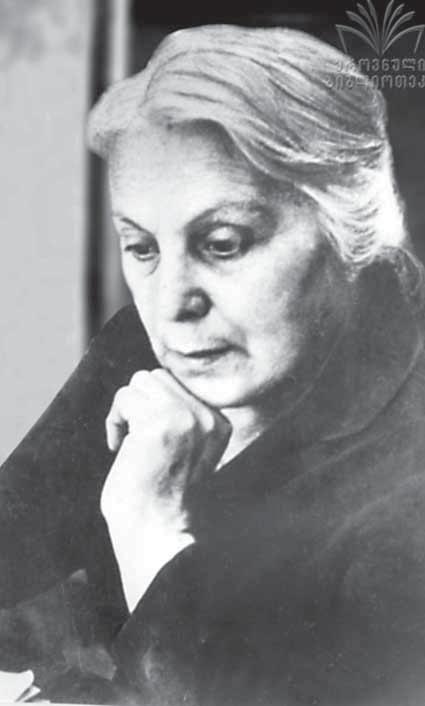
*Good Morning*
Little bird, little bird, Who are you singing to?
To you, to you, my little one, Good morning, I’m singing to you.
The sun, nine-eyed, Who are you smiling to?
Wake up, my little one, Good morning, I say to you.
Oh, little flower, Why have you opened your bud?
I want it for you, my little one, Look at it with your little eye.
Well, I’ll also get up at once, Wash my hands and face too, And say Good morning, To all of you.
Reproducing material, photos and advertisements without prior editorial permission is strictly forbidden. The author is responsible for all material. Rights of authors are preserved. The newspaper is registered in Mtatsminda district court.
Reg. # 06/4-309
GEORGIA TODAY JANUARY 27 - FEBRUARY 2, 2023 11 CULTURE GEORGIA TODAY
Makvala Mrevlishvili.
Source: National Parliamentary Library of Georgia
Anita Rachvelishvili by Dario Acosta BY LILY FÜRSTENOW-KHOSITASHVILI





 BY SOPHIE HODLER
BY SOPHIE HODLER




























